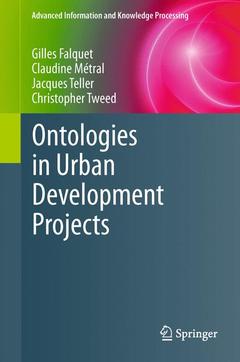Description
Ontologies in Urban Development Projects, 2011
Advanced Information and Knowledge Processing Series
Authors: Falquet Gilles, Métral Claudine, Teller Jacques, Tweed Christopher
Language: English
Subjects for Ontologies in Urban Development Projects:
105.49 €
In Print (Delivery period: 15 days).
Add to cartPublication date: 11-2013
241 p. · 15.5x23.5 cm · Paperback
105.49 €
In Print (Delivery period: 15 days).
Add to cartPublication date: 07-2011
241 p. · 15.5x23.5 cm · Hardback
Description
/li>Contents
/li>Comment
/li>
Introduction.-An Introduction to Ontologies and Ontology Engineering.-Ontologies for Interoperability.-Alignment and Viewpoints in Ontologies.-Ontologies and Multilingualism.-Part II : Ontologies in the Urban Domain.-Ontologies in the Geographic Information Sector.-Ontologies for Interconnecting Urban Models.-Call for LOD – Linking Scales and Providers through Digital Spatial Representations.-Ontology-Based Interoperability in Knowledge-Based Communication Systems.-Transformation of Urban Knowledge Sources to Ontologies.-Part III Case Studies.-Examples of Developing and Using Ontologies in Practice.-URMOPRO: An Example of an Urban Ontology for the Formalization of Morphological Processes.-OUR City Cohesion Policies: Practices of Ontologies For Urban Regeneration (OUR): The Case Of The Puglia Region.-An Ontology for Urban Mobility.-The Development of Thesauri by English Heritage.-Ontology and the Scottish Building Regulations.-Road System Ontology: Organisation and Feedback.-Impact of BIMs on Business Models in Construction Industry.-Lessons Learned and Current Challenges.
These books may interest you

Introduction to Bio-Ontologies 56.31 €



